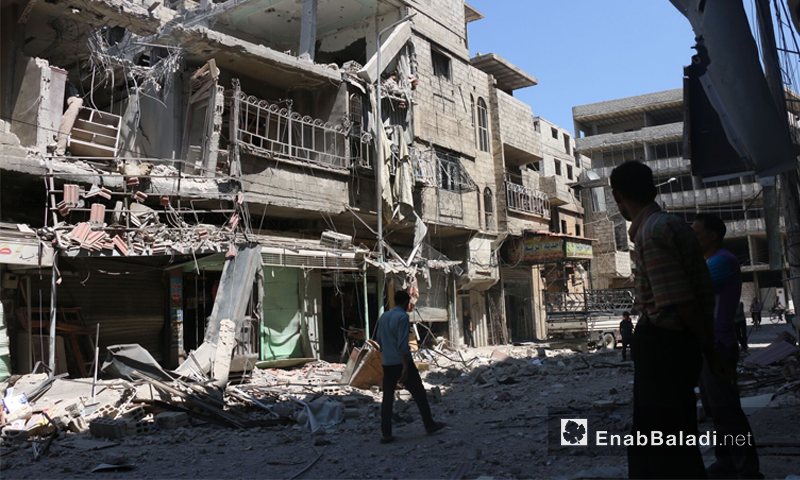



The “local reconciliation agreements” forced by the Syrian regime’s government in different Syrian areas, such as Daraya, al-Zabadani, Madaya in Rif Dimashq province, and al-Waer neighborhood in Homs city, were held after a prolonged and illegitimate siege while bombarding these areas by the Russia-backed regime. This led to a mass exodus of civilians, according to a report issued by Amnesty International Organization in 2017.
These agreements enabled the regime to control the lands included in the settlement deals by evacuating the population of these areas in the green buses, which became a symbol of dispossession, according to Amnesty’s report.
In an interview with Enab Baladi, The Syrian lawyer and Head of the “Free Syrian Lawyers” organization, Ghazwan Koronfol said that the regime’s forced displacement policy sought to reshape the Syrian society and its demographic structure.
In February 2018, the “Free Syrian Lawyers” organization launched an online platform to document individuals’ property ownership in different areas of the Syrian conflict.
The platform enables Syrian owners of destroyed or confiscated real estate to preserve ownership documents of their lands and real estate and follow up on their legal statues regardless of their residence location.
Through the platform, individuals can register the kind of acts that were inflicted against their properties due to the conflict in Syria.
According to Koronfol, real estate may be subjected to unlawful and legal property crimes.
He said unlawful acts include taking possession of a house or land in a military or security manner without due process.
On the other hand, aggressions under a legal cover occur when the regime’s government provides legal tools and procedures to seize people’s real estate properties.
According to Koronfol, the regime’s government facilitated the confiscation of property through a series of laws and administrative decisions it has enacted since the beginning of the Syrian revolution in 2011.
Most controversial of these laws is Law No. 10 of 2018, and the subsequent and wide local and international protest and condemnation campaign against this decision.
The law also evoked advocacy campaigns; nevertheless, it was amended by Law No. 42 of 2018.
The online platform for real estate property documentation is facing numerous challenges to succeed as a legal model that preserves people’s rights.
For instance, the response from the targeted group (the owners of affected real estate) to this platform is “below the expectations,” according to Koronfol. He attributed the reason to the lack of adequate media coverage and the ignorance of property owners of the future consequences of this matter.
“The inability to employ the media to talk about the necessity of documenting property ownership prevents it from reaching the public all the time,” according to Koronfol.
In turn, this causes insufficient awareness among people to recognize their responsibility to preserve their property and to check on their legal status inside Syria, especially for Syrian refugees in Europe.
The Turkey-based “Syrian Free Lawyers” organizes initiatives and gatherings in several Turkish cities to explain the risks of the Syrian regime’s real estate decrees used as a tool to rob people of their property rights. The initiatives aim to increase property owners’ interest to fully understand these laws.
However, the Turkish authorities’ preventive measures to curb the spread of the novel coronavirus (COVID-19) pandemic have halted such property rights initiatives.
Nevertheless, initiatives and gatherings will be resumed once coronavirus’ restrictions are eased, and gatherings are allowed, according to Koronfol.
Most of the cases registered on the online platform through the organization’s website are from Homs province in central Syria and other cities in Idlib governorate in Syria’s north, as per Koronfol.
In Koronfol’s opinion, most people’s lack of interest in preserving their property rights is due to the belief that their real estate properties are safe as long as they are documented in the land registry.
He pointed out the possibility of disposing of people’s property through laws that would allow the regime’s government to do so, such as the “Anti-Terror” Law No. 19 of 2012.
This law granted the power to the public prosecutors to freeze the moveable and immovable assets for everyone accused of terrorism in Syria.
As by Law No. 19, courts are obliged to confiscate the movable and immovable assets for those convicted of terrorism.
Koronfol called on owners of damaged or assaulted properties in Syria to send any document that would prove their ownership, such as an image of the real estate registry record or an electricity bill issued for that particular property.
According to Koronfol, the online platform documents the real estate ownership, then the “Free Syrian Lawyers” organization shares the information with the international human rights agencies.
The organization makes agreements with these international agencies only when they stand out in international venues to defend Syrians’ property rights.
if you think the article contain wrong information or you have additional details Send Correction